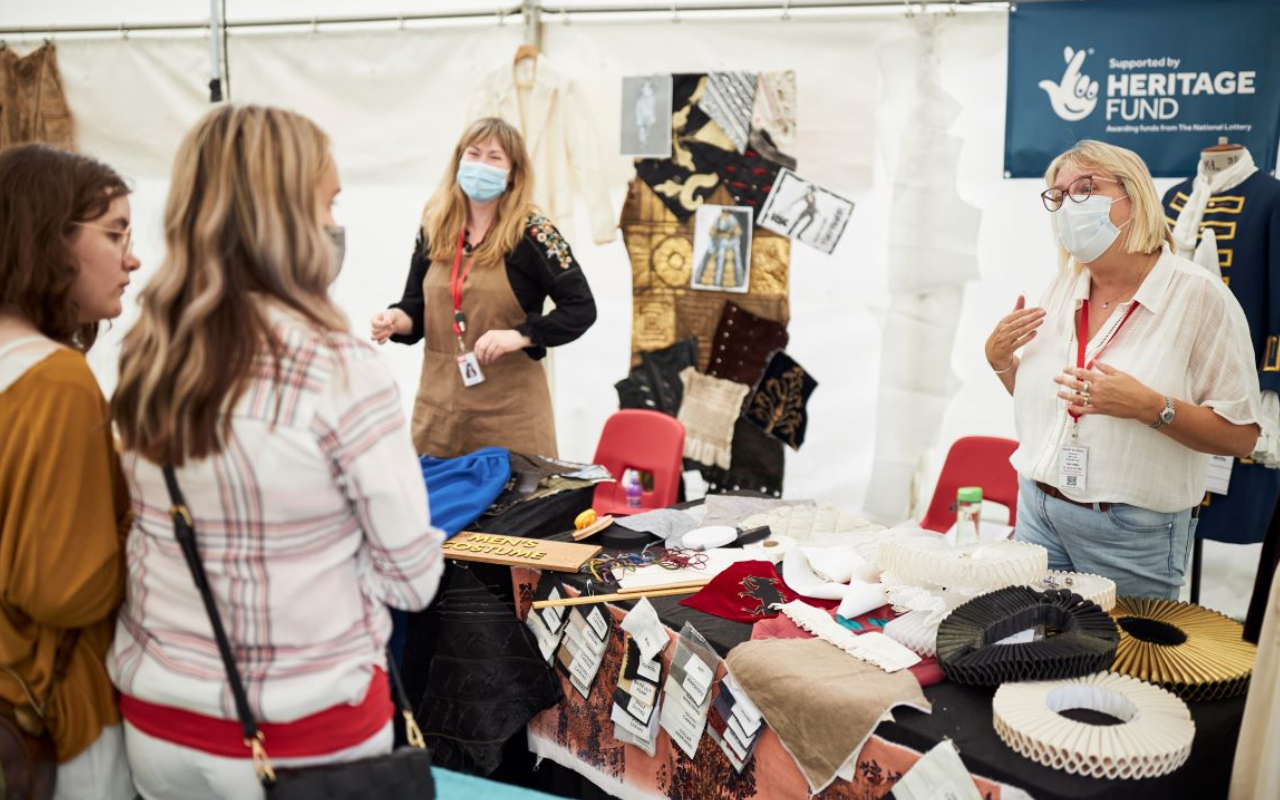
Costume Day, 20 August 2021
Photo: RSC
Threads connecting costumes to communities
A project on the history of costume making has created meaningful new relationships with communities outside the theatre walls, write Emma Gibbons and Tara Johnston-Comerford.
In 2021, the Royal Shakespeare Company (RSC) reopened its Costume Workshop, a redevelopment of our listed buildings into state-of-the-art costume making facilities for the largest in-house costume-making department of any British theatre.
Funded by the National Lottery Heritage Fund, THREADS was a programme that worked with the local community to make connections to the costume making heritage of Stratford Upon Avon. It culminated in Costume Day, a festival that welcomed nearly 7,000 people to celebrate the new building and the costume making history of the town.
The RSC’s Creative Placemaking and Public Programmes (CPPP) department has been creating innovative and engaging activities and moments around its theatre production cycle for many years. When the pandemic hit, we were shifting towards a new way of working with communities and co-creation at its heart. THREADS became an opportunity to reach our communities in new ways, providing the backbone to this future work.
The scale of the programme meant that there was an opportunity to reach broadly and deeply into different communities, and the pandemic led to the reshaping of the programme to put community recovery for those audiences most in need at its centre.
Costume making to communicate heritage
The history of costume making is woven deep into Stratford Upon Avon dating back to Shakespeare’s father’s skills as a glove maker. The RSC Museum houses costumes dating back to Shakespeare performances by the Benson Company in 1899. This history is a powerful platform to communicate heritage in ways that make personal connections.
Acknowledging the barriers and challenges of taking heritage projects into communities, and with the experience gained from pilot work and consultations, we developed 10 key words to frame our interpretation and approach.
Celebration | Vibrant | Pride | Connections | Doing | Making | Living | Changes | Tactile | Community
These words provided not just inspiration to share with the creatives involved, but also a framework for decision making and prioritising that became a lifeline in a year that required constant adaption and risk mitigation.
Interweaving heritage
The 8 strands of work that comprise the programme were delivered in 9 months during 2021. Some focused on open access events, activities and outdoor performances; others on work with schools and community groups.
One – Woven – involved four community groups physically weaving together images from the RSC costume archive with participants’ own images. A support group for newly arrived Syrian women used images of their families from home. For most, English wasn’t their first language, but the materiality of the photos, pulling together colours and textures from their images and matching them with costumes in our collection, created a bridge and a way to communicate about heritage where words failed.
“What surprised me was how involved the Syrian women were. At previous meetings … we’ve struggled to find activities which created a bridge between us – but this one certainly did. It was your suggestion that we use their images alongside the RSC archival images; and it worked.” Kathy, group organiser.
The Woven sessions, led by Birmingham based artist Nilupa Yasmin, produced many pieces of woven artwork that were gathered together to create a costume, designed and made by RSC Costume Designer Bretta Gerecke. This spectacular piece was displayed at Costume Day and now part of the RSC museum collection and archive.
Telling oral history stories
As part of the THREADS programme, volunteers conducted 17 oral history interviews with people who had either worked in or had memories of the RSC’s costume workshop. Their training encouraged them to see themselves as explorers digging through memories and drawing out the most interesting parts.
These oral histories have since been entwined in the programme. Storytellers repurposed them for narrating on boats journeying down the river Avon as part of Costume Day. We developed videos of these magical moments which continue to be shared and ensure that the lived experiences and memories of the old costume workshop are taken into the future.
“I really appreciated getting to be a part of this project and having this to keep returning to during the pandemic, and I feel that it has provided a much-needed challenge for my confidence, quick thinking skills and people skills during this time. It was a fascinating and insightful project that opened my eyes to the excitement of a part of theatre history and production that I had previously known little about.” Meghan, oral history volunteer.
Broader perspective on what to collect
A key factor across all community strands of work were the partnerships we have formed, allowing us to match interests to our collections and to discover overlapping themes. Partnership working continues as a core part of the CPPP programme, providing learning for us and our participants. THREADS has shifted community perception of the RSC and breadth of its work beyond the stage.
The RSC’s Theatre Tours now include a visit to the Costume Workshop – so the stories, memories and experiences gathered through THREADS will be shared with visitors for years to come.
We were delighted our engagement work also changed the way our Collections Manager, Robyn Greenwood saw her role: “The way that Tara and Emma have talked about and worked with heritage has changed the way I think about the collection. It's given a broader perspective in terms of what we collect from the company. There’s a change in scope of not just collecting the production and its details, but the social and local stories that surround the productions too.”
Emma Gibbons and Tara Johnston-Comerford are Engagement Officers at the Royal Shakespeare Company.
Join the Discussion
You must be logged in to post a comment.